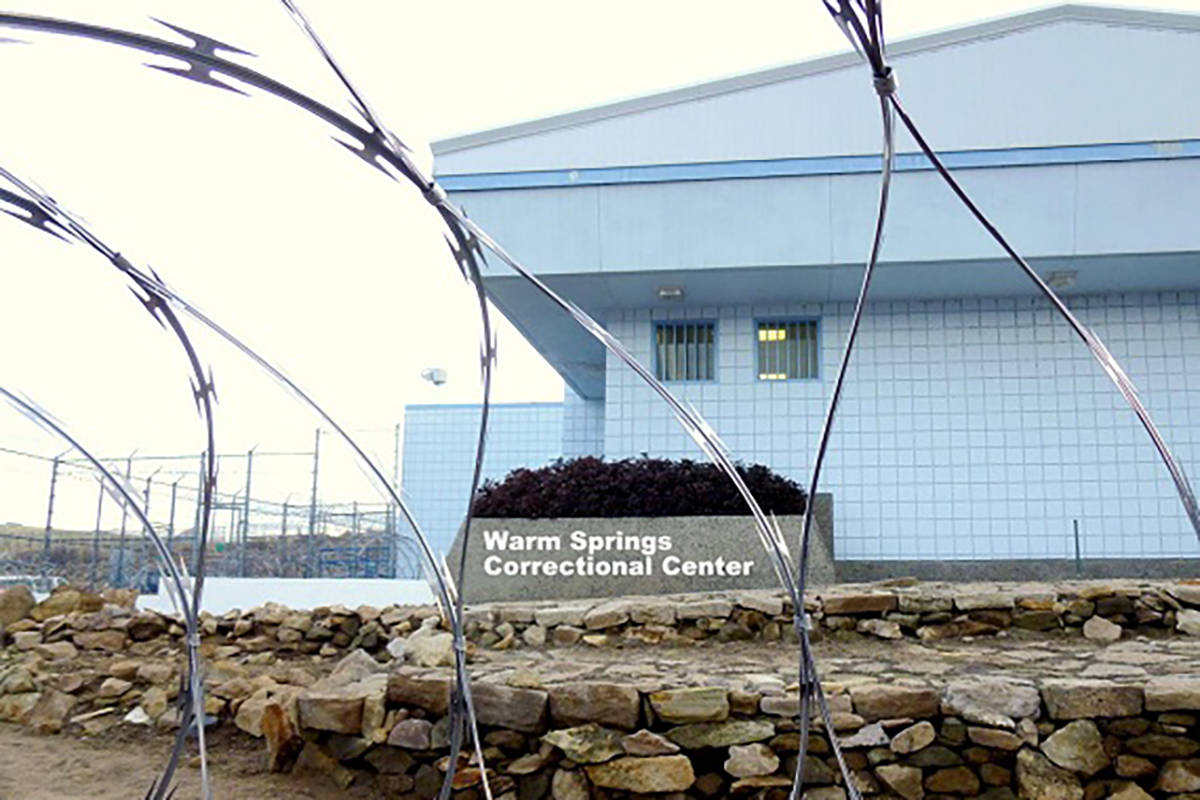Carson City official calls for field hospital to treat prisoners
The Carson City manager has requested that the state supply a field hospital to treat the 470 prisoners who have tested positive for the coronavirus at Warm Springs Correctional Center, which advocates and family members said is a “human rights crisis.”
During Nevada’s weekly COVID-19 task force meeting Thursday, Carson City Manager Nancy Paulson called for the Department of Corrections to establish a field hospital “in an effort to reduce the impact of our overall hospital operations” at Carson Tahoe Regional Medical Center.
According to Department of Health and Human Services data last updated Thursday morning, 470 prisoners at the facility have tested positive, along with 55 staff members.
The Department of Corrections on Friday said in a statement that the prison houses 525 people, meaning 90 percent of the population has now tested positive.
Two weeks ago, the department had reported only 27 prisoners had tested positive since the start of the pandemic. That number has since skyrocketed to 567 prisoners throughout state prison facilities, nearly 83 percent of whom are housed at Warm Springs Correctional Center.
The American Civil Liberties Union of Nevada, along with advocacy groups Mass Liberation Project and Return Strong, held a virtual news conference Thursday afternoon to call attention to the outbreak they said is being ignored by state officials.
‘Choking on our fear’
Leslie Turner, an organizer with the Mass Liberation Project, questioned why Gov. Steve Sisolak wasn’t discussing the outbreak when giving updates on the pandemic.
“I want to be clear that this isn’t about partisan politics,” she said. “This is, and has always been, about fighting for the people who no one else is fighting for.”
Many women with Return Strong spoke about loved ones incarcerated at the Warm Springs Correctional Center, which they said was locked down with little outside communication since the department publicly reported the spike in cases.
“Not one word from the governor’s office — no outrage, no concern, no action — just more silence,” said Jodi Hocking, whose significant other is incarcerated at a different Nevada prison. “Meanwhile families are sitting here choking on our fear.”
Hocking, who founded Return Strong, said the group heard from their loved ones that the outbreak could have stemmed from a prisoner working in the kitchen who tested positive. It could also have come from correction officers who interact with people outside the facility. But the Department of Corrections has not answered their questions, she said.
Nikki Levy, a staff attorney with the ACLU, said confusion over the outbreak points to what she described as a lack of transparency from the department that has lasted months. In March, the ACLU sent letters to state agencies asking how prisons were responding to the pandemic and requesting prisoners to be released, but the organization did not receive a “substantive response,” she said.
“Our plan should not ever have been to wait for the virus to spread before we took action,” Levy said. “The plan had to be to take action early when we, and all of these groups here, started initially requesting that we do that to prevent the situation that we’re in now in Warm Springs.”
Call for release
ACLU policy director Holly Welborn said that to slow the virus, the state should release people who have less than six months left on their sentence, or who are elderly or high-risk for the coronavirus and have less than two years left on their sentence.
“This is not an attempt to try to expedite some sort of ‘quote, criminal justice reform agenda,’” she said. “This is a human rights crisis occurring in Nevada prisons.”
One woman said her husband has tested positive for the virus at Warm Springs Correctional Center, and she’s afraid he won’t make it home to meet their 6-month-old daughter.
“My hope is you can see him as a human being,” said Jen, who, like many of the women with Return Strong, declined to give her last name due to fear of retaliation against her husband.
Another woman, Shasta, said her partner incarcerated at the prison has lost more than 30 pounds in 11 days. She said he’s unable to buy food from the commissary, has been given “inedible food,” and has been afraid to eat meals because he doesn’t want to get sick.
“We need to governor to make decisions immediately,” Shasta said. “You have the authority and we are counting on you to do the right thing for all the citizens in your state, not just the free ones.”
Contact Katelyn Newberg at knewberg@reviewjournal.com or 702-383-0240. Follow @k_newberg on Twitter.











































